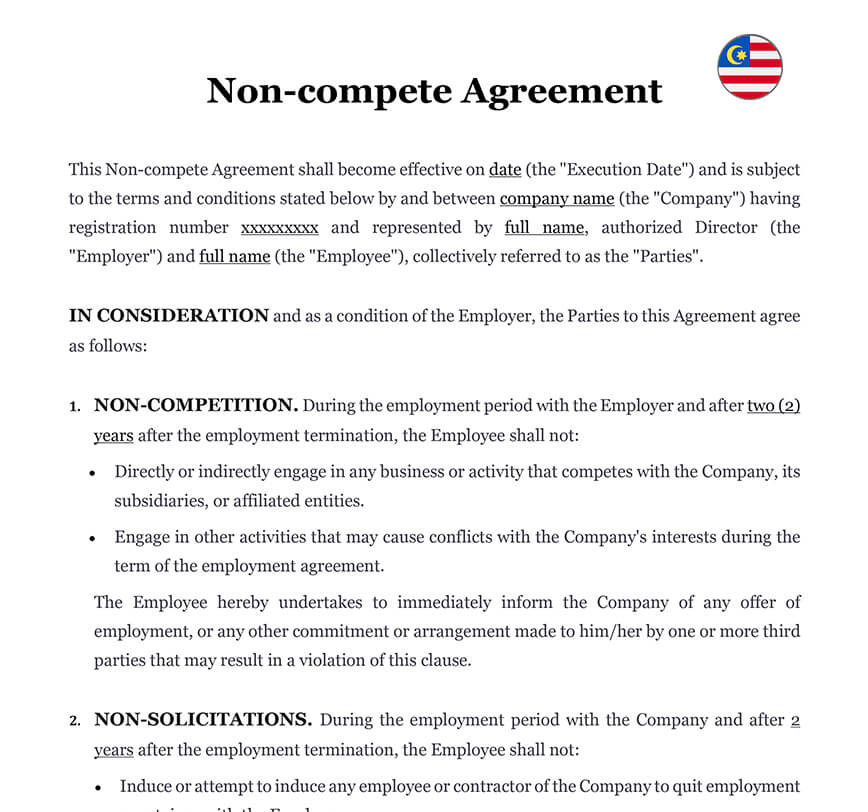Ready to use legal template
Drafted by experienced lawyers
Compliant with Hong Kong law
Ready to use legal template
Drafted by lawyers
Compliant with Hong Kong law
Learn more about Employee Non-compete Agreement in Hong Kong
An Employee Non-compete Agreement is a legally binding contract that restricts an employee from engaging in competitive activities against their employer during and after their employment. In Hong Kong, these agreements are commonly used to protect a company’s trade secrets, client relationships, and business interests. However, under Hong Kong law, non-compete clauses must be reasonable in scope, duration, and geographic limitation to be enforceable. Employers must carefully draft such agreements to ensure they do not impose excessive restrictions that could be challenged in court. A well-drafted Employee Non-compete Agreement helps businesses safeguard their competitive edge while ensuring compliance with legal standards. Download our Employee Non-compete Agreement, expertly drafted for use in Hong Kong and available in an easy-to-edit Word format, to protect your company’s interests while maintaining fairness in employment practices.
Table of contents
-
What is an Employee Non-compete Agreement in Hong Kong?
-
What is included in this Employee Non-compete Agreement?
-
Is an Employee Non-compete Agreement enforceable in Hong Kong?
-
How long can a Non-compete Agreement last in Hong Kong?
-
Can a Non-compete Agreement cover local and international markets?
-
What are reasonable restrictions in a Non-compete Agreement?
-
Can an Employee Non-compete Agreement apply after termination?
-
What industries commonly use Employee Non-compete Agreements?
-
What happens if an employee breaches a Non-compete Agreement?
What is an Employee Non-compete Agreement in Hong Kong?
An Employee Non-Compete Agreement in Hong Kong is a legally enforceable contract that restricts an employee from engaging in competitive activities during or after their employment. Its primary aim is to protect the employer’s legitimate business interests, such as trade secrets, client relationships, and market position. These clauses are common in industries like finance, technology, and legal services. However, under Hong Kong law, non-compete agreements are only enforceable if they are reasonable in scope, duration, and geographical coverage. Courts scrutinize these clauses carefully to ensure they do not unfairly restrict an employee’s ability to earn a living. Typically, durations range from 6 months to 2 years, depending on the nature of the business. Employers must define the restricted activities clearly and justify the necessity of such a clause. Overly broad or vague terms are likely to be struck down. To ensure enforceability, legal advice is strongly recommended.
What is included in this Employee Non-compete Agreement?
This Employee Non-Compete Agreement contains essential clauses to protect the employer’s business while maintaining compliance with Hong Kong law:
| ➤ Non-Competition: The employee agrees not to engage in any competing business, directly or indirectly, during employment and for two years after termination. |
| ➤ Non-Solicitation of Employees and Contractors: The employee is prohibited from recruiting or influencing company personnel during employment and two years post-termination. |
| ➤ Confidentiality of Competitive Information: The employee must not disclose or misuse any sensitive business data that could harm the company’s competitive standing. |
| ➤ Notification of Competitive Employment Offers: The employee must inform the employer if offered a role with a competitor to ensure compliance with the agreement. |
| ➤ Scope of Restricted Activities: The employee agrees not to serve as a competitor, consultant, shareholder, or in any conflicting role with the company’s interests. |
| ➤ Duration of Non-Competition Obligation: The non-compete restrictions remain in effect for two years following the end of employment. |
| ➤ Governing Law: The agreement is governed by Hong Kong law, with all disputes resolved under its jurisdiction. |
| ➤ Severability: If any clause is deemed invalid, the remainder remains enforceable. Invalid terms may be revised to reflect the parties’ intent. |
| ➤ Entire Agreement: This clause confirms the document reflects the full understanding regarding non-compete terms, overriding prior discussions. |
| ➤ Acknowledgment: Both parties confirm they understand and voluntarily agree to all terms and obligations set forth in the agreement. |
Is an Employee Non-compete Agreement enforceable in Hong Kong?
1. Enforceability of Non-Compete Agreements in Hong Kong
In Hong Kong, non-compete agreements are enforceable only if they are reasonable. Courts assess whether the restrictions placed on the employee are excessive or unnecessary. The duration, scope, and geography of the agreement must be justifiable to protect the employer’s legitimate business interests, such as proprietary information or trade secrets. If the restrictions are deemed unreasonable, the agreement may be unenforceable. Employers should carefully consider the extent of the restrictions to avoid potential legal challenges.
2. Protecting Legitimate Business Interests
To ensure that a non-compete clause is enforceable, the employer must prove that it is necessary to protect the business from unfair competition. The agreement should be designed to protect valuable business assets, such as client relationships and intellectual property, without unduly limiting the employee’s future employment opportunities. A well-drafted non-compete agreement should balance business needs with fairness to the employee. For more information on non-compete clauses in Hong Kong, visit the Hong Kong Labour Department.
- Remarks:
Hong Kong courts assess the reasonableness of non-compete clauses based on business interests and employee rights. Agreements that excessively limit an employee’s ability to work may be deemed unenforceable. Employers should ensure their clauses are not overly restrictive.
How long can a Non-compete Agreement last in Hong Kong?
1. Validity of Non-Compete Clauses in Hong Kong
In Hong Kong, non-compete clauses are generally enforceable if they last between 12 to 24 months after employment ends. This period is typically considered reasonable for protecting a company’s legitimate business interests, such as trade secrets and client relationships. However, non-compete clauses lasting longer than 24 months are usually not upheld unless the employer can demonstrate a strong need for the extended duration. The clause must also be reasonable in scope, territory, and the type of work the employee is restricted from engaging in.
2. Enforcement and Industry-Specific Considerations
For positions involving highly sensitive information such as executive roles or jobs with access to proprietary technology Hong Kong courts may consider a non-compete period of up to two years as reasonable. However, this is not automatic. The employer must clearly demonstrate that the restriction is essential to protect legitimate business interests. Courts will also weigh the impact on the employee’s right to work and earn a living. If the terms are overly broad or impose unnecessary hardship, the agreement may be ruled unenforceable. Precision, justification, and balance are key to upholding such clauses.
ℹ️ An Employee Non-Compete Agreement is often part of the employment contract, outlining the terms of the employee’s obligations both during and after their employment.
Can a Non-compete Agreement cover local and international markets?
A non-compete clause can be enforceable in Hong Kong and internationally, provided that the scope is reasonable. The enforceability will depend on whether the employee had access to relevant competitive information and if the geographic scope of the clause is not overly broad. Below is a summary of key points regarding the international reach of non-compete clauses.
| ➤ Reasonableness of Scope: A non-compete clause may extend internationally if the company has global operations and the employee had access to strategic or competitive information with international relevance. |
| ➤ Assessment by Courts: Courts in Hong Kong will review whether the geographic scope is reasonable and not overly broad. Any restriction must be proportionate to the employer’s legitimate business interests. |
| ➤ Jurisdiction: The agreement may apply both in Hong Kong and abroad, but the international reach must be specifically justified in the context of the employee’s role and access to sensitive data. |
| ➤ Enforcement Challenges: If the clause is legally challenged, the employer must provide clear justification for the international or wide regional application, demonstrating a legitimate interest that warrants such protection. |
What are reasonable restrictions in a Non-compete Agreement?
1. Reasonable Restrictions for Non-Compete Clauses
Reasonable non-compete clauses aim to balance the protection of an employer’s business interests with an employee’s right to earn a living. These restrictions often include barring the employee from working with direct competitors within the same industry or prohibiting the solicitation of current clients and employees. Such clauses may also limit the disclosure of sensitive business information that could give competitors an advantage. To ensure fairness, these restrictions usually define a specific time frame, often ranging from 6 to 24 months, during which the employee must refrain from certain activities.
2. Legal Considerations and Court Evaluation
When evaluating the reasonableness of a non-compete clause, courts in Hong Kong take several factors into account, such as the employee’s position and access to confidential data, as well as their influence over the market. They also assess whether the geographical limitations imposed by the clause are focused on areas where the employee had actual influence. Courts are likely to enforce these restrictions if they are narrowly tailored to protect the employer’s business interests without being overly burdensome on the employee. For more detailed information, refer to the Hong Kong Labour Department.
Can an Employee Non-compete Agreement apply after termination?
1. Post-Employment Restrictions in Hong Kong
In Hong Kong, post-employment restrictions such as non-compete, non-solicitation, and confidentiality clauses commonly remain in effect for up to two years after an employee leaves a company. These provisions are designed to safeguard the employer’s legitimate business interests, including client relationships, trade secrets, and confidential information. For these clauses to be enforceable, they must be reasonable in scope, duration, and geographic area. If the restrictions are too broad or unreasonably hinder the employee’s ability to find new work, Hong Kong courts may refuse to enforce them. Balance and necessity are key to their validity.
2. Enforceability and Reasonableness
For post-employment restrictions to be legally enforceable under Hong Kong law, they must be carefully drafted to avoid unreasonably restraining trade or limiting an employee’s ability to work in their field. Courts will evaluate several factors, including the duration of the restriction, the geographical coverage, the employee’s level of access to sensitive information, and the nature of their role. If the terms are considered fair and proportionate to protect the employer’s legitimate business interests, such as trade secrets or client connections, they are generally upheld by the courts.
- Remarks:
Post-employment restrictions, such as non-compete clauses, are enforceable for up to two years in Hong Kong. However, they must be proportionate and not excessively hinder the employee’s future employment opportunities. Employers should ensure that such restrictions are justifiable under Hong Kong law.
What industries commonly use Employee Non-compete Agreements?
Non-compete agreements are essential in industries where proprietary information, intellectual property, or key relationships are crucial to business success. These agreements are used to protect valuable business assets and ensure that employees do not use sensitive information to benefit competing companies.
| ➤ Finance and Banking: Protects sensitive financial information, client relationships, and proprietary financial methods. |
| ➤ Legal and Consulting Services: Safeguards confidential legal strategies, client lists, and proprietary methodologies. |
| ➤ IT and Software Development: Prevents the misuse of proprietary code, technology, and technical knowledge. |
| ➤ Sales and Marketing: Protects marketing strategies, client relationships, and sales data. |
| ➤ Healthcare and Pharmaceuticals: Safeguards confidential medical research, client data, and proprietary pharmaceutical information. |
| ➤ Manufacturing and Engineering: Protects proprietary designs, manufacturing methods, and trade secrets. |
ℹ️ For employees working remotely with a Remote Working Contract, an Employee Non-Compete Agreement can still be enforced, as it ensures that remote workers adhere to the same business protection measures as in-office employees.
What happens if an employee breaches a Non-compete Agreement?
1. Legal Remedies for Breach of Non-Compete Agreement
If an employee breaches a non-compete agreement in Hong Kong, the employer has several options for legal recourse. The employer can request injunctive relief, asking the court to issue an order to prevent the employee from engaging in competitive activities. This court order aims to halt any actions that may harm the employer’s business interests. Additionally, the employer can seek damages to recover financial losses caused by the breach, particularly if the employee’s actions have led to a loss of clients, trade secrets, or market share.
2. Enforcement and Proof of Breach
In cases of non-compliance, employers must ensure that the non-compete agreement is reasonable and enforceable under Hong Kong law. Courts will assess the validity of the agreement based on factors such as the duration and scope of the restrictions. Employers must present substantial evidence of the breach, such as proof of the employee’s involvement in competitive activities. Furthermore, it is essential that the employer demonstrates that the non-compete clause was made clear to the employee at the time of signing, as courts will not excuse ignorance of the terms.
Conclusion
An Employee Non-Compete Agreement is a powerful tool for businesses operating in Hong Kong to protect their competitive position, intellectual property, and client base. However, these agreements must be drafted with care to ensure enforceability and fairness. The key to a successful non-compete agreement lies in its reasonableness balancing the employer’s need for protection with the employee’s right to work. This agreement template includes clearly defined restrictions, a two-year post-termination period, and global coverage where justified, all compliant with Hong Kong legal standards. Employers should always tailor non-compete clauses to the specific role and industry and seek legal advice when in doubt. Employees should read and understand the terms before signing to avoid legal consequences later. Download our professionally prepared Employee Non-Compete Agreement today to safeguard your business interests with confidence.
SPECIAL OFFER
HR Pro
15 Document Package
Essential documents for managing employees in Hong Kong
Non-compete AgreementTemplate (.docx)
Save on attorney fees
310 client reviews (4.8/5) ⭐⭐⭐⭐⭐
Share information
Why Themis Partner ?
Make documents forhundreds of purposes
Hundreds of documents
Instant access to our entire library of documents for Hong Kong.
24/7 legal support
Free legal advice from our network of qualified lawyers.
Easily customized
Editable Word documents, unlimited revisions and copies.
Legal and Reliable
Documents written by lawyers that you can use with confidence.




